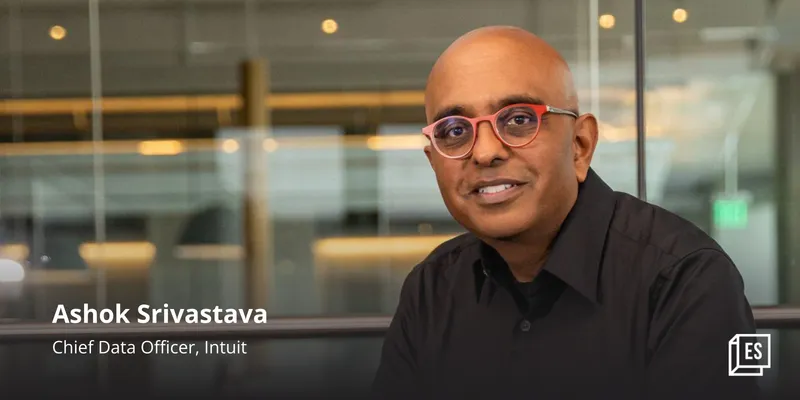India is driving velocity and creativity for Intuit’s GenAI platforms, says the firm’s chief data officer
The US headquartered business software company–which specialises in financial software–has its second largest development centre in Bengaluru, India. The India centre makes key contributions to Intuit’s generative artificial intelligence platforms.
Generative artificial intelligence (GenAI) has become a transformational opportunity for organisations providing enterprise solutions. Intuit–the California-headquartered global software company that provides financial products to small businesses and individuals–has been an early rider of this wave, with consistent investments in this technology over the last six years.
And this has reaped early benefits, Ashok Srivastava, Chief Data Officer of Intuit, tells YourStory. He says the company is just at the tip of a massive transformation that GenAI is going to unleash upon the world, and its India development centre will continue to make key contributions to this advanced tech.
Having built its own operating system ‘GenOS’ and a financial assistant ‘Intuit Assist’ with GenAI capabilities, Intuit is betting big on the global innovation potential of GenAI. The company has two clear goals along this path: increase the success rate of small businesses and double the household savings rate. On both these counts, Intuit has achieved a high success rate, says Srivatsava.

has a customer base of over 100 million with the core constituents being small businesses and individuals. To cater to the needs of this market, the company is incorporating GenAI capabilities into its products TurboTax, MailChimp, Credit Karma, and QuickBooks, so that the experience of financial transactions becomes smoother.
Srivastava cites an example of how small businesses can get in-depth insights on their cash flows by just typing a query on Intuit Assist, which then provides all the relevant graphs, recommendations, and personalised information.
Intuit is witnessing more than 730 million AI-driven customer interactions per year and generating 58 billion machine learning predictions per day globally. Numbers apart, the most important objective for Intuit, according to Srivastava, is proving that GenAI is actually helping people make the best financial decisions for themselves and their family.
Edited excerpts from the interview with Srivatsava
YourStory (YS): How is Intuit engaging with the world of AI?
Ashok Srivastava (AS): Intuit is a 40-year-old company constantly reinventing itself. We have gone through many technological cycles and economic shifts but AI is very different. More than five years ago, we made a tremendous investment in AI, and it really took off–an acknowledgement of the fact that the AI era is here. We were early to the game because we believed that this was going to be as revolutionary as electricity or the internet.
We declared that AI and data were core to our strategy and started to reimagine what we were going to do with our customers about five years ago. We are not only ready for it but we have also built revolutionary capabilities in order to power that.
Two months ago, we launched a generative AI (GenAI) operating system to assist developers that abstracts away the issues and complexity of dealing with data platforms, security, governance, and processes so that developers can move with speed. We have also built Intuit Assist, a GenAI product built into our flagship products that essentially changes the way small businesses and consumers get access to insights. We are shifting to a platform where the work is done for them with their permission, rather than just doing it on a panel.
YS: What has been the progress of AI within Intuit?
AS: Our GenAI capability Intuit Assist allows people to ask natural language questions and get far more intuitive responses than a traditional chatbot. It gives insights, cash-flow predictions, and new ways to understand small business finance. This is so different from a menu-driven approach to getting answers. I can essentially converse with it through text, and it gives me back answers. We are seeing this as a major growth driver for Intuit.
A few years ago we decided on two goals. The first goal was to increase the success rate for small businesses and the second goal was to double the household savings rate. Small businesses on our AI driven platform are nearly 19 points more likely to be successful than others. For consumers, we are already at 1.6x compared to those that do not use it. This shows the power of the platform and the investments we have made in AI.
YS: How are Intuit’s customers benefitting from AI and GenAI in particular?
AS: There are three major customer benefits. The first one is that small businesses and consumers do not want to work and want work to be done for them. The second thing is they want more money. And the third thing is they want confidence when they do this. We track all of these outcomes for AI and GenAI.
For example, in the area of reducing work, Intuit Assist allows a person to quickly get insights about their cash flow, without having to run a bunch of reports and do an analysis themselves. They can just type their question and Intuit Assist will provide graphs, recommendations, and personalised information. The AI model also makes predictions about future cash flow. This a great example of blending of AI and generative AI.
For many Americans, tax refund is the largest pay cheque they get, and we are very proud that our product TurboTax uses AI, knowledge, engineering, and other advanced capabilities to find the best tax refund for a person given their very complex circumstances. So, it puts more money in real people’s pockets. And it does this by delivering confidence all throughout. Consumers actually get insights into why their taxes are the way they are through a conversational interface that is powered by GenAI.
YS: Would you say GenAI has made Intuit’s platforms much more intuitive?
AS: Yes, it has, and we are excited about that. We are just at the beginning, and the best is yet to come. Our GenAI operating system is unlocking the creativity of thousands of developers so that they can develop world-class products, which will help our customers make the very best financial decisions for themselves and their family.
YS: How is Intuit integrating GenAI capability into the company’s array of products?
AS: Six years ago, we started making investments into AI and data that gave the platform capabilities at scale. Now, through GenAI, we have got unmatched speed and scale. We are architecting this company for velocity. For example, our code development is nine times faster today than what it was in 2020. This is because of the platform investments that we have made.
YS: How is the India centre contributing to Intuit’s GenAI capability?
AS: The team here is astonishing in speed, velocity and creativity. We have a world-class AI team here with amazing statisticians and data scientists.
We have people who are building the GenAI and data platforms capabilities. We also have people who are building capabilities for our platform and data systems so that we have clean real-time data flowing through this company, with proper governance, security and responsible AI capabilities.
We are going to continue to invest in AI because of the talent and skills that individuals have here.
YourStory: What are the specific GenAI skills that the India centre has developed?
AS: We have a world-class team that's working on forecasting and planning problems. They are working on creating capabilities that reduce the probability of large language models to hallucinate for certain use cases. They are also developing capabilities to understand how to attract and retain customers and power real-time events across the entire company.
The contribution of the India team is going to grow exponentially, both in terms of AI and the overall company strategy.
Edited by Saheli Sen Gupta and Swetha Kannan






